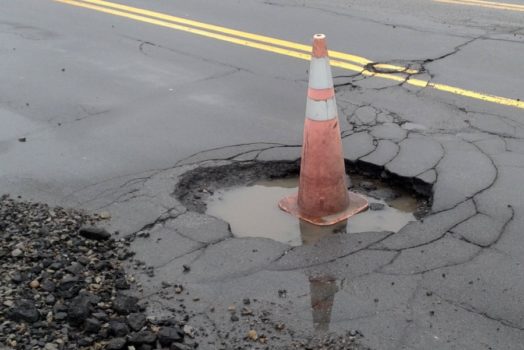
By RICK BRUNDRETT
Over the past three years, the S.C. Department of Transportation denied a total of nearly 2,300 pothole-damage claims filed by motorists statewide – more than half of all such requests received during the period, The Nerve found in a review of agency records.
Motorists collectively sought more than $4.8 million in 4,325 pothole-damage claims received by DOT from 2018 through last year, with listed settlements totaling $802,609, or 16.5% of the overall requested total, according to the records, obtained under the S.C. Freedom of Information Act.
Records show there were 20 separate claims seeking at least $10,000 in damages, including five individual claims of $300,000 or more. All but three of the 20 requests were denied.
The average requested claim over the three-year period was $1,118; the average approved settlement was $396, The Nerve’s review found. Of the total 4,325 claims received during the period, 2,292 were denied and 2,022 were approved, with the remainder labeled either pending or appealed.
The records provided to The Nerve identified only the counties where the claimed damages occurred. The state’s larger counties generally had the largest number of filed and denied claims.
Motorists who want to file a pothole damage claim against DOT must submit a damage claim form – which has to be notarized – plus two repair estimates or a paid invoice to the DOT maintenance office in the county where the incident occurred, the agency’s website says.
Claims must be filed within a year from the date of the incident. By law, DOT, or its insurer, the state Insurance Reserve Fund (IRF), has 180 days after a claim is received to decide whether the claim will be paid or denied.
The Nerve in 2019 revealed that in fiscal year 2019, DOT paid 569 claims through the IRF totaling nearly $2.2 million in damages in an IRF category labeled “Manhole, Pothole, Drain.”
Asked about pothole damage claims in The Nerve’s latest review, Amanda Turbeville Taylor, DOT’s assistant chief counsel, in a written response said DOT pays approved claims of less than $1,500 and seeks reimbursement from the IRF, minus a $250 deductible, adding that the IRF pays settlements of more than $1,500.
In a typical denial letter to motorists filing damage claims, DOT says it’s not legally liable “unless it had notice of the defect prior to the incident in question and failed to make a repair in a reasonable time.”
“In other words, if SCDOT did not know of a defective condition, it cannot be held responsible for not repairing it,” according to the letter, a copy of which was provided to The Nerve by a motorist whose pothole damage claim was denied in March.
But the department apparently knows where many potholes are located, contending in its latest annual report that it patched about 679,300 potholes statewide during fiscal year 2020, which ended last June 30, as The Nerve reported earlier this month.
The Nerve repeatedly has pointed out that the agency continues to move slowly to fix South Carolina’s bad roads and bridges with revenues generated under the gas-tax-hike law, which took effect on July 1, 2017.
The law raised the state’s gasoline tax by 12 cents per gallon over six years – a 75% jump from the base 16 cents – and increased other vehicle taxes and fees.
Lawmakers promised that the gas-tax-hike money would be used to fix crumbling roads and bridges in the state. But DOT continues to sit on a massive surplus generated with those revenues, while agency records show that in recent months, the total dollar value of completed paving projects statewide has remained less than half of the overall estimated cost of all such projects, as The Nerve has reported.
The South Carolina Policy Council, the parent organization of The Nerve, has contended the gas-tax-hike law was written in a way to divert revenues to the State Transportation Infrastructure Bank (STIB) to pay off bond debts. The STIB over the years funneled several billion dollars to large construction projects in select counties.
The Nerve’s latest review of DOT records found that the following counties had the largest total number of denied pothole-damage claims from 2018 through 2020: Richland (553), Spartanburg (176), York (173), Greenville (160), Charleston (152) and Lexington (139).
The largest listed settlement over the three-year period was $2,271. The records also show zero payments in 280, or 13.8%, of the 2,022 approved claims.
Asked about the 280 cases, Taylor in her written response said she couldn’t give a definite answer without reviewing those records, though she added one possible explanation is that DOT recommended approval, and the IRF “actually paid the claims.”
Brundrett is the news editor of The Nerve (www.thenerve.org). Contact him at 803-254-4411 or rick@thenerve.org. Follow him on Twitter @RickBrundrett. Follow The Nerve on Facebook and Twitter @thenervesc.
Nerve stories are free to reprint and repost with permission by and credit to The Nerve.
